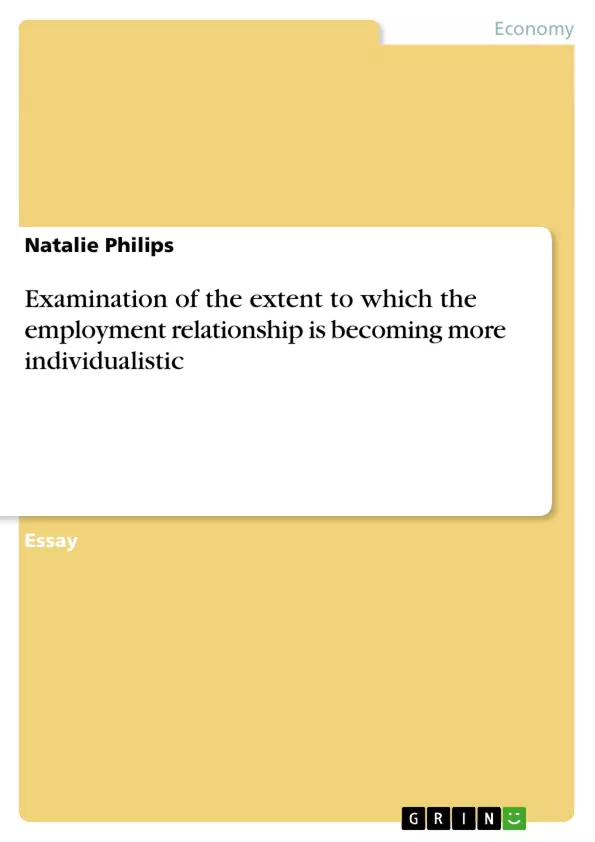Trade union membership has been steadily declining since 1979. According to the Trade
Union Membership Statistics (BIS, 2013), a growth of around 59,000 to 6.5 million trade
union members in year 2012 was recorded. Nevertheless, in the year 2011, for the first time
since the 1940s, trade union membership has decreased below six million. Accompanied by
this development, is the rising trend of individualism in the relationship between employers
and employees. The workforce these days is characterised by diverse individual interests,
higher expectations concerning the extent of determination in the employment relationship
and accordingly strives for direct say over employment agreements.
However, there is some disagreement about the balance of individualism or collectivism in
the employment relationship among industrial relations academics and practitioners (Legge,
1989, Purcell & Gray, 1986). For this reason it is worthwhile to scrutinise this aspect in more
detail. The objective of this essay is to critically examine the extent to which the employment
relationship is becoming more individualistic. First of all, to set the scene for the following
analysis the key terms ‘individualism’ as well as ‘collectivism’ will be defined and the main
perspectives associated with them will be presented. After that, focusing on individualistic
and collectivistic aspects, the historical development of the altering nature of the British
employment relationship will be outlined. Finally, based on these findings, a conclusion will
be drawn.
To begin with, the notion of individualism, according to Purcell and Gray (1986:213), is
marked by “[employers’] policies based on belief in the value of the individual and his or her
right to advancement and fulfilment at work”. The concept of collectivism is whereas defined
as “the recognition by management of the collective interests of groups of employees in the
decision making process” (Purcell & Gray, 1986:213). [...]
Inhaltsverzeichnis (Table of Contents)
- Individualism vs. Collectivism in the Employment Relationship
- Defining Individualism and Collectivism
- Pluralism and Unitarism: Perspectives on Industrial Relations
- Historical Development of the British Employment Relationship
- The Post-War Period: Collectivism and Trade Union Dominance
- The Thatcher Era: Individualism, Deregulation, and Union Decline
- The Rise of Human Resource Management (HRM)
- The New Labour Era: Partnership and Individual Employment Rights
- Conclusion
Zielsetzung und Themenschwerpunkte (Objectives and Key Themes)
This essay aims to critically examine the extent to which the employment relationship in Britain has become more individualistic. It explores the concepts of individualism and collectivism in the context of industrial relations, analyzing their historical evolution within the British context. The key themes explored include:- The shifting balance between individualistic and collectivistic practices in the employment relationship.
- The influence of political ideologies and government policies on the development of industrial relations.
- The role of trade unions and their changing power dynamics.
- The impact of human resource management (HRM) on individualization of the employment relationship.
- The ongoing debate regarding the coexistence of individualism and collectivism in modern workplaces.
Zusammenfassung der Kapitel (Chapter Summaries)
The essay begins by defining the key terms "individualism" and "collectivism," drawing on the perspectives of prominent scholars like Purcell and Gray. It then introduces two contrasting organizational frames of reference—pluralism and unitarism—highlighting their implications for the employment relationship. The historical analysis explores the shift in the British employment relationship, starting with the post-World War II period, characterized by strong trade union presence and collectivist bargaining practices. The essay then examines the impact of Margaret Thatcher's conservative policies, which emphasized individualism, deregulation, and a decline in union power. The rise of human resource management (HRM) is presented as a key factor in individualizing the employment relationship, promoting direct communication, performance-related pay, and individualized contracts. The essay concludes by analyzing the impact of the New Labour government, which aimed to create a partnership approach in the employment relationship, emphasizing cooperation and joint decision-making. The chapter highlights the ongoing debate regarding the coexistence of individualistic and collectivistic practices within modern workplaces.Schlüsselwörter (Keywords)
The essay focuses on the central concepts of individualism, collectivism, and industrial relations in the context of the British employment relationship. Key terms include: trade unionism, collective bargaining, human resource management (HRM), pluralism, unitarism, and the impact of government policies on labor relations.Frequently Asked Questions
Is the employment relationship becoming more individualistic?
The essay critically examines this trend, noting a decline in trade union membership and a rise in individualized agreements between employers and employees.
What is the difference between individualism and collectivism in HR?
Individualism focuses on policies based on the value and rights of the individual worker, while collectivism involves management recognizing the collective interests of employee groups.
How did the Thatcher era affect British industrial relations?
Margaret Thatcher's policies emphasized deregulation and individualism, leading to a significant decline in trade union power and collective bargaining.
What role does Human Resource Management (HRM) play in individualization?
HRM practices often promote direct communication, performance-related pay, and individualized contracts, shifting away from collective structures.
What was the "New Labour" approach to employment?
The New Labour era aimed for a partnership approach, emphasizing cooperation and individual employment rights alongside joint decision-making.
What are the current trade union membership trends in the UK?
Membership has seen a long-term decline since 1979, falling below six million for the first time in the 2010s, despite occasional small growths.
- Quote paper
- Natalie Philips (Author), 2013, Examination of the extent to which the employment relationship is becoming more individualistic, Munich, GRIN Verlag, https://www.grin.com/document/268121



